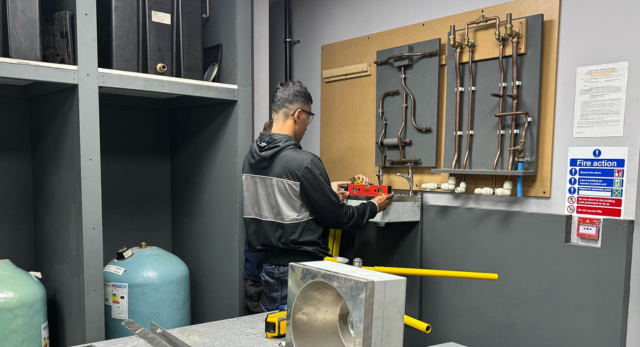At Logic4training, we take the wellbeing of all our learners very seriously and do all we can to support their learning requirements and make them feel comfortable when they’re training at our centres. LCL Awards’ Inclusivity Charter sets out the range of standards we adhere to, to ensure the Logic4training centres are welcoming spaces where candidates feel respected, confident to learn and develop their careers.
Dave Mcinnis is 63. He’s been a heating engineer for many years and undertook two gas courses at our training centre in Basildon where he was trained by Leon Lloyd and Glen Stother:
- MET4 Meters – Designed for gas engineers involved in the fitting, exchange, removal and commissioning of Non Domestic diaphragm gas meters
- COMCAT 5 – Core Commercial Catering Appliances (COMCAT5) a training course for experienced gas catering engineers who wish to work on forced draught burner appliances
Dave is successful in his work and has taken a number of gas courses over the years including his five-yearly ACS qualifications, but he struggles with assessments because he has dyslexia. He had a rough time at school, where the condition was undiagnosed and he was labelled a ‘dunce’ and he’s had some pretty awful experiences at other training centres who have been more than happy to take his money, but not so keen in giving him the help he needs to support his learning.
Dyslexia is a learning difficulty that makes it challenging for people to process information. It most commonly affects people’s reading and writing skills but can also impact other areas such as memory and organisational abilities. Dyslexic people are often creative and have strengths in areas such as reasoning.
In order to receive the appropriate learning support, Dyslexic people are required to undergo a Diagnostic Assessment which will give a clearer picture of their strengths and weaknesses and make recommendations for their support in learning and during exams. This is also known as a Statement. Dave had his back in 2003. He explains:
“It’s been really difficult over the years getting the support I need to learn and I’m not alone. I’m often treated as an idiot, which affects my confidence. Many other engineers like me really struggle with assessments. It’s hard to read the questions and to understand them – particularly when you’re under stress. When I’m at work, I’m fine – I know what I’m doing. The challenge comes when I’m faced with something I haven’t done before; then I’m a fish out of water.
“Logic4training have been brilliant! Glen and Leon were incredible all the way. I’m fine with practical learning, but it’s the written stuff that I find hard, particularly if the text is on white paper when the words jump about. Logic4training was amazing offering the support I needed to learn. It’s very reassuring to know when you start out on a course that you’ll get the support you need at the end during the assessment – they read the questions for me when I couldn’t manage and checked what I’ve written for legibility so I felt I was giving a decent account of myself”
Mark Ashley manages the Logic4training centre in Basildon where Dave took his ACS:
“Dyslexia is a fairly common learning difficulty amongst our candidates, and we do all we can to make them feel at ease as stress only makes things worse. We listen to what they have to say and do all we can to adapt the learning to suit them. A number of our trainers here have dyslexia themselves, so they’re sympathetic to the condition and the needs of those with it.
“When it comes to the assessment, we offer practice sessions beforehand so that candidates can familiarise themselves with the set up here and we can alter the background colour on the screens of our online assessment programme, XAMS, to help with reading.”
Trainer Glen Stother supported Dave through his COMCAT5 course and has done the same for many other learners:
“Some members of my family have Dyslexia, so I’m familiar with the condition and how to help. Technology has provided some good answers too, some learners use electronic pens and spellcheck is a great help.
“At their induction, everyone is asked whether they have any learning difficulties and if they do, we ask to see their statement. That way we can work out a plan, ahead of time. We try to be flexible. Recently we had a learner who brought his partner along to the assessment and they read out the questions for him. Everyone is different and we are here to help them however we can.”
If you need learning support for your training don’t be shy in coming forward. We’re here to help you succeed. Give us a call and we’ll make a plan!









